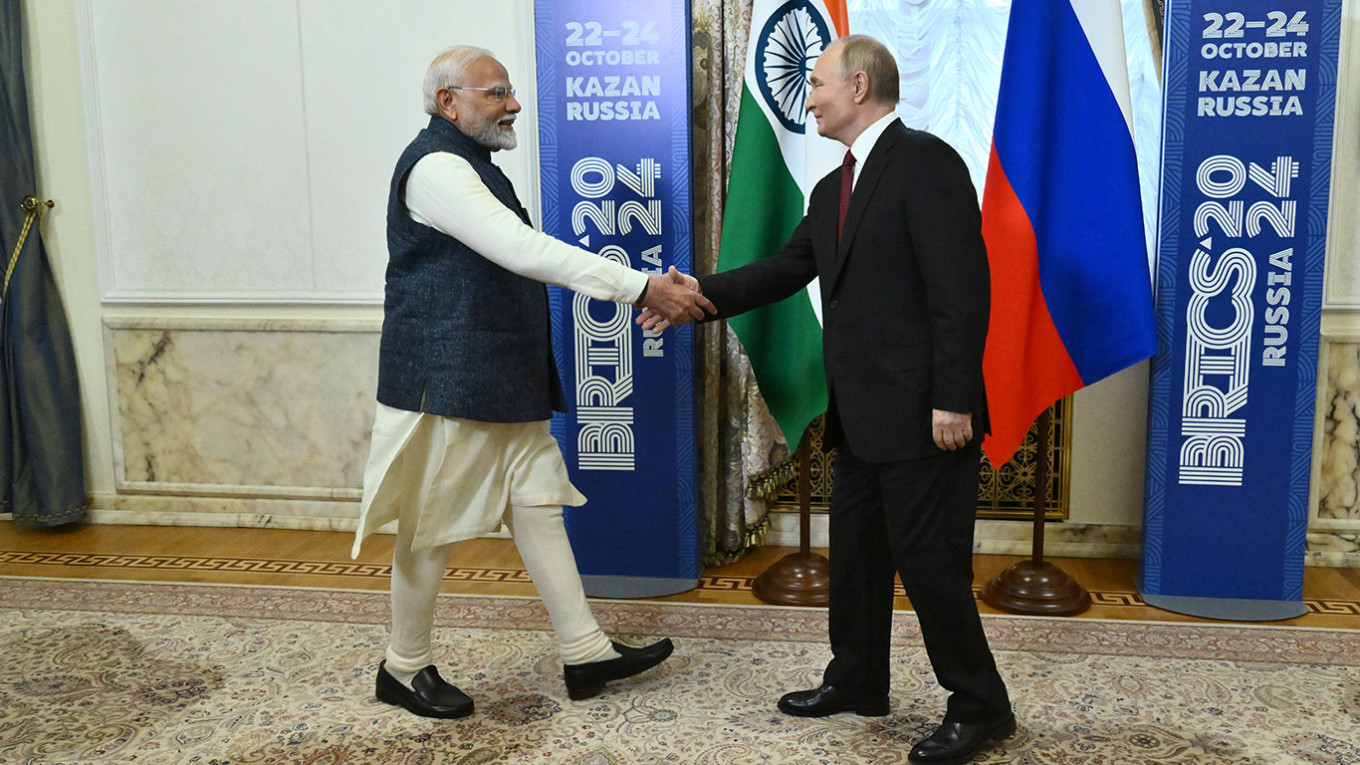
Modi meets Putin at the BRICS meeting and demands peace in Ukraine
On the eve of the BRICS meeting, Indian Prime Minister Narendra Modi informed Russian President Vladimir Putin that he desired peace in Ukraine and that New Delhi was prepared to assist in bringing an end to the worst conflict in Europe since World War Two.
After the United States and its allies in Europe and Asia attempted to isolate Russia over the war, Putin, who in February 2022 deployed tens of thousands of soldiers into Ukraine, wants the BRICS summit to highlight the growing influence of the non-Western world.
The BRICS, which make up 45% of the world’s population and 35% of its GDP, are hosting a summit conference that Russia expects 22 leaders to attend, including Chinese President Xi Jinping, who arrived on Tuesday.
Putin, who is portrayed by the West as a war criminal, said Russia and India had a “privileged strategic partnership” and congratulated Prime Minister Modi for accepting the offer to visit Kazan, a city on the banks of the Volga.
In addition to praising the development of BRICS and expanding collaboration, Modi complimented Putin for their “strong friendship” and stated that India believed the issue in Ukraine should be resolved amicably.
“We have been in constant touch on the subject of the ongoing conflict between Russia and Ukraine,” added Modi. “We believe that problems should be resolved only through peaceful means.”
“We wholeheartedly endorse the prompt restoration of stability and peace. Humanity comes first in whatever we do. He stated that he will speak with Putin about the matter and that India was prepared to offer any assistance in the future.
Amid the Middle East and Ukraine wars, a faltering Chinese economy, and concerns that the U.S. presidential election may spark new trade conflicts, world financial leaders are meeting in Washington for the BRICS conference.
With BRICS growing and a waiting list of possible members, some people are concerned that the group may become unmanageable.
The major buyers of Russian oil, China and India, have tense ties, while Arab countries and Iran are not at all at odds.
INTERESTS IN SECURITY
Putin stated that Moscow would not give away the four areas of eastern Ukraine that it claims are now part of Russia and that Moscow wants its long-term security interests taken into consideration in Europe when BRICS reporters questioned him on the likelihood of peace.
The world was waiting for the outcome of the U.S. presidential election on November 5, according to two Russian sources, even though there was growing discussion in Moscow about a potential ceasefire deal.
Approximately 80% of the Donbas, a coal and steel area that includes the Donetsk and Luhansk regions, over 70% of the Zaporizhzhia and Kherson regions, and a fifth of Ukraine, including Crimea, which it unilaterally invaded and annexed in 2014, are under Russian control.
Putin stated that he was willing to discussions based on draft ceasefire accords negotiated in Istanbul in April 2022, but that the West had now realized that Russia would prevail.
Putin met with Sheikh Mohammed bin Zayed Al Nahyan, the president of the United Arab Emirates, at his Novo-Ogaryovo home outside of Moscow on the day of the BRICS conference for casual discussions that lasted till midnight.
The BRICS
Sheikh Mohammed and Saudi Crown Prince Mohammed bin Salman, who will not be present at the Kazan meeting, have both received plaudits from Putin for their attempts to mediate the situation in Ukraine.
“We are ready to make any efforts to resolve crises and in the interests of peace, in the interests of both sides,” Sheikh Mohammed told Vladimir Putin.
Following medical advice to temporarily avoid long-haul flights due to a brain injury sustained at home, Brazilian President Luiz Inacio Lula da Silva canceled his trip.
Jim O’Neill, the top economist of Goldman Sachs at the time, came up with the acronym BRIC in 2001 in a study that highlighted the enormous development potential of China, India, Russia, and Brazil this century.
Formal meetings with China, India, and Russia were followed by those with Brazil, South Africa, Egypt, Ethiopia, Iran, and the United Arab Emirates. Saudi Arabia is still not officially a member.
According to figures from the International Monetary Fund, the Group of Seven main Western nations will account for around 28% of the world’s GDP by the end of this decade, down from 30% this year, while BRICS is expected to account for 37%.
Russia is trying to persuade the BRICS nations to create a different international financial system that would not be subject to Western sanctions.
All Categories
Recent Posts
Tags
+13162306000
zoneyetu@yahoo.com



